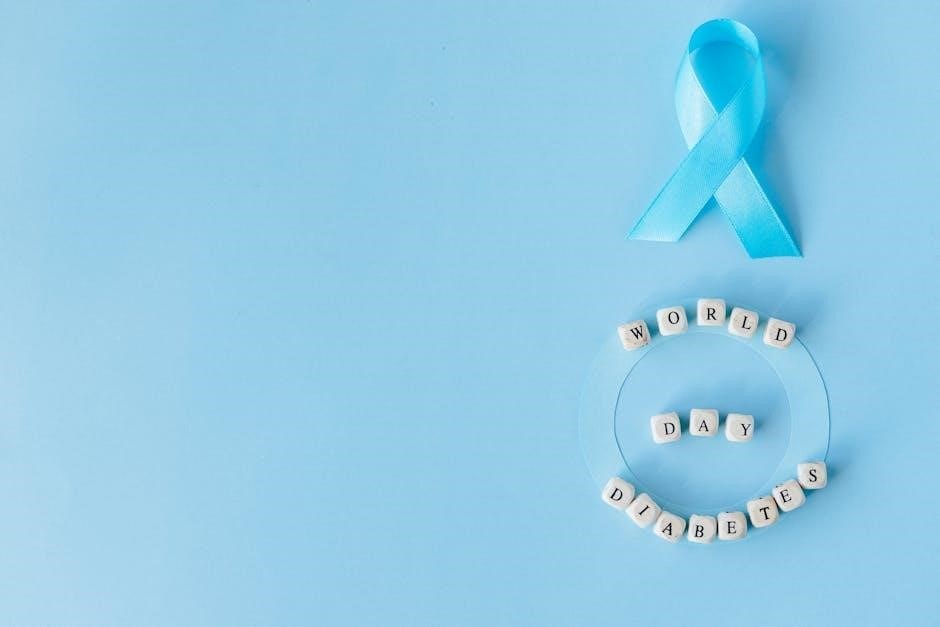Diabetes sick day guidelines are essential for managing diabetes during illnesses. They provide tips on monitoring, adjusting treatments, and preventing complications. Being prepared helps maintain blood sugar control and reduces risks when unwell. These guidelines ensure a structured approach to staying healthy during sickness.
Importance of a Sick Day Plan for Diabetes Management
A sick day plan is crucial for diabetes management, as illnesses can disrupt blood sugar control and increase the risk of complications. It helps individuals with diabetes navigate challenges like high blood sugar, dehydration, and medication adjustments. By having a clear plan, patients can monitor their condition effectively, prevent severe complications, and avoid hospitalization. A well-prepared plan ensures continuity of care, providing guidance on testing, hydration, and emergency signs. It also offers peace of mind, empowering individuals to manage their health confidently during sickness. Consulting a healthcare provider to tailor the plan is essential for personalized care and better outcomes.
How to Prepare for Sick Days
Preparing for sick days is vital to manage diabetes effectively. Start by gathering essential supplies, such as a blood glucose meter, test strips, and ketone testing kits. Keep a list of emergency contact numbers, including your healthcare provider and diabetes team. Stock up on fast-acting carbohydrates, electrolyte-rich drinks, and non-perishable snacks. Ensure you have an adequate supply of medications and insulin. Designate a caregiver or family member to assist if needed. Organize a sick day kit with items like a thermometer, logbook, and pens. Review and update your plan regularly with your healthcare provider to ensure it meets your specific needs. Being prepared helps you stay in control and respond promptly to changes in your condition, reducing the risk of complications during illness.
The Impact of Illness on Blood Glucose Levels
Illness often increases blood glucose levels due to stress hormones and reduced insulin sensitivity. This makes diabetes management more challenging during sickness, requiring careful monitoring and adjustments.
Why Blood Sugar Levels Rise When Sick
When sick, the body releases stress hormones like cortisol and adrenaline, which raise blood sugar levels. These hormones help the body respond to illness but can make managing diabetes harder. Additionally, being unwell often leads to reduced appetite and altered eating patterns, which can disrupt normal glucose control. Dehydration from fever or vomiting can also contribute to elevated blood glucose. Furthermore, inflammation and infection can increase insulin resistance, making it harder for glucose to enter cells. These factors combined create a perfect storm that can cause blood sugar levels to rise significantly during illness, making close monitoring essential to prevent complications.
Understanding the Risks of High Blood Sugar During Illness
High blood sugar during illness can lead to serious complications, such as diabetic ketoacidosis (DKA), a potentially life-threatening condition. Prolonged hyperglycemia can also cause organ damage and worsen dehydration. When blood sugar remains elevated, the body may produce ketones, which can build up and lead to DKA. Additionally, high blood sugar can impair the immune system, slowing recovery and making it harder to fight off infections. If left unmanaged, these risks can escalate quickly, especially for those with type 1 diabetes. Recognizing these dangers emphasizes the importance of close monitoring and timely interventions during sick days to prevent severe health issues.

Monitoring and Testing During Sick Days
Regular blood sugar checks and ketone testing are crucial during illness to avoid complications. Monitoring helps adjust treatments and ensures recovery stays on track;
Frequency of Blood Glucose Testing
During sick days, blood glucose levels should be checked more frequently, ideally every 2-3 hours, especially if levels are high or symptoms persist. This helps identify trends and prevents complications. Testing at least 4-6 times daily is recommended, even if you’re unable to eat or experiencing vomiting. Monitoring patterns allows timely adjustments to insulin doses and fluid intake. Your healthcare team can provide personalized advice based on your specific condition. Frequent testing ensures early detection of hyperglycemia and reduces the risk of diabetic ketoacidosis (DKA). Consistency in testing is key to maintaining control and recovering smoothly from illness. Stay vigilant and adjust your testing schedule as needed to avoid serious complications.
Checking for Ketones
Checking for ketones is crucial during sick days, especially if blood glucose levels are high. Ketones are substances produced when the body breaks down fat for energy due to lack of insulin. High ketone levels can lead to diabetic ketoacidosis (DKA), a serious complication. Use urine ketone strips, such as KetoStix, to test for ketones. Testing should be done whenever blood sugar exceeds 250 mg/dL, you feel unwell, or if you have symptoms like nausea or vomiting. If ketones are present, contact your healthcare provider immediately. Testing frequency may increase during illness to monitor levels effectively. Early detection helps prevent complications and ensures timely medical intervention. Always follow your healthcare team’s guidance on ketone testing and management during sick days.

Monitoring Weight and Fluid Intake
Monitoring weight and fluid intake is vital during sick days to manage diabetes effectively. Weight changes can indicate fluid loss or retention, which may affect insulin dosing. Aim to drink plenty of fluids, such as water or sugar-free drinks, to stay hydrated and help your body recover. If you’re unable to eat, focus on fluids to prevent dehydration. Track your fluid intake to ensure you’re meeting daily goals, especially if blood glucose levels are high. Weigh yourself daily to monitor for significant changes. If vomiting occurs, try small, frequent sips of fluids. Electrolyte-rich beverages may be recommended to replace lost salts. Keeping a log of fluids and weight can help identify potential issues early and guide adjustments in your care plan. Proper hydration supports overall health and blood sugar balance during illness.

Managing Medications and Insulin During Illness
Managing medications and insulin during illness is crucial to maintain blood sugar control. Adjust insulin doses as needed, and continue medications unless advised otherwise by your healthcare provider.
Adjusting Insulin Doses When Sick
When sick, blood sugar levels can rise due to stress and reduced food intake. Adjusting insulin doses becomes necessary to maintain control. If you take insulin, your dosage may need to increase to counteract high blood sugar. Always consult with your healthcare provider or diabetes care team for specific guidance. They can help determine the right adjustments based on your blood sugar readings. It’s important to monitor your levels closely and keep a record to share with your healthcare provider. Never make significant changes without professional advice to avoid complications like diabetic ketoacidosis.
Medication Adherence During Sick Days
Adhering to your medication regimen is crucial during sick days to maintain blood sugar control. Even if you’re unable to eat or experiencing vomiting, continue taking your diabetes medications as prescribed. If you miss doses, your blood sugar levels may rise, increasing the risk of complications like diabetic ketoacidosis. Always consult your healthcare provider for guidance on adjusting medications during illness. Keep a list of your medications and share it with your care team to ensure they can provide personalized advice. Staying consistent with your medication schedule, even when unwell, helps prevent blood sugar fluctuations and supports overall health. Don’t hesitate to reach out to your diabetes care team if you have concerns or need assistance managing your medications while sick.
Diet and Hydration Tips for Sick Days
Focus on eating small, frequent meals and staying hydrated to manage blood sugar levels. Opt for easily digestible foods like crackers, toast, and clear broths. Avoid sugary drinks and ensure regular fluid intake to prevent dehydration, which can worsen symptoms. If vomiting occurs, consider fast-acting carbs like glucose tablets or juice to stabilize blood sugar. Keep a sick-day food list handy and prioritize electrolyte-rich beverages to maintain balance. Monitoring and adjusting your diet helps maintain glucose control and supports recovery during illness.
Recommended Foods and Drinks for Sick Days
When managing diabetes during illness, it’s crucial to focus on foods that are easy to digest and help maintain blood sugar balance. Opt for small, frequent meals and include fast-acting carbohydrates like glucose tablets or juice if blood sugar drops. Clear broths, crackers, and toast are excellent options to stabilize blood sugar without overwhelming the stomach. Avoid sugary drinks and caffeine, as they can worsen dehydration. Incorporate electrolyte-rich beverages, such as coconut water or sports drinks, to replace lost salts and fluids. Plain yogurt, applesauce, and bananas are also gentle on the digestive system; Stay hydrated by sipping water regularly, and consider adding a pinch of salt to water to replenish lost electrolytes. If nausea persists, consult your healthcare provider for guidance on managing your diet effectively.
Importance of Staying Hydrated
Staying hydrated is crucial when managing diabetes during illness. Dehydration can worsen high blood sugar levels and increase the risk of complications like diabetic ketoacidosis (DKA). Even mild dehydration can affect blood sugar control and insulin effectiveness. Aim to drink plenty of fluids, such as water or sugar-free beverages, to help your body recover. If nausea or vomiting makes it difficult to drink, try sipping small amounts regularly—every 15-30 minutes. Electrolyte-rich drinks, like coconut water or sports drinks, can help replace lost salts. Avoid caffeine and sugary drinks, as they may dehydrate you further. Proper hydration supports overall health and helps stabilize blood glucose levels during sickness. Always consult your healthcare provider if dehydration persists or worsens.

Recognizing Emergency Situations
Severe vomiting, dehydration, chest pain, or confusion are diabetes emergency signs. Contact your healthcare provider immediately if these occur, especially with high blood sugar or ketones present.
Warning Signs of Diabetic Ketoacidosis (DKA)
DKA symptoms include nausea, vomiting, abdominal pain, and rapid breathing. Other signs are fatigue, dry mouth, frequent urination, and fruity breath odor. High blood sugar and ketone levels worsen these symptoms. If left untreated, DKA can lead to confusion, loss of consciousness, or even coma. Immediate medical attention is crucial for preventing severe complications. Regularly checking ketones during illness helps detect DKA early. Blood glucose levels above 250 mg/dL paired with ketones indicate a potential emergency. Contact a healthcare provider if these symptoms arise, especially with persistent vomiting or dehydration.
When to Seek Immediate Medical Attention
If experiencing severe vomiting, dehydration, or confusion, seek medical help immediately. High blood sugar levels paired with ketones in urine or blood indicate a potential emergency. Symptoms like rapid breathing, fruity breath odor, or abdominal pain may signal diabetic ketoacidosis (DKA), requiring urgent care. If blood glucose levels remain above 250 mg/dL despite corrections, contact a healthcare provider. Severe hypoglycemia, characterized by loss of consciousness or seizures, also demands immediate attention. Persistent fever, chills, or inability to manage blood sugar warrant a call to your diabetes team. Delaying medical care can lead to serious complications, so act promptly if these warning signs arise.
Diabetes sick day guidelines are crucial for maintaining control during illnesses. Always stay prepared with a sick day plan tailored to your needs. Regularly monitor blood glucose and adjust medications as advised. Keep emergency contacts handy and seek help if symptoms worsen. Staying hydrated and eating recommended foods helps manage blood sugar. Remember, early intervention prevents complications like DKA. Review and update your plan with your healthcare team annually. By following these tips, you can navigate sick days confidently and safely. Always prioritize your health and act promptly if emergencies arise.
